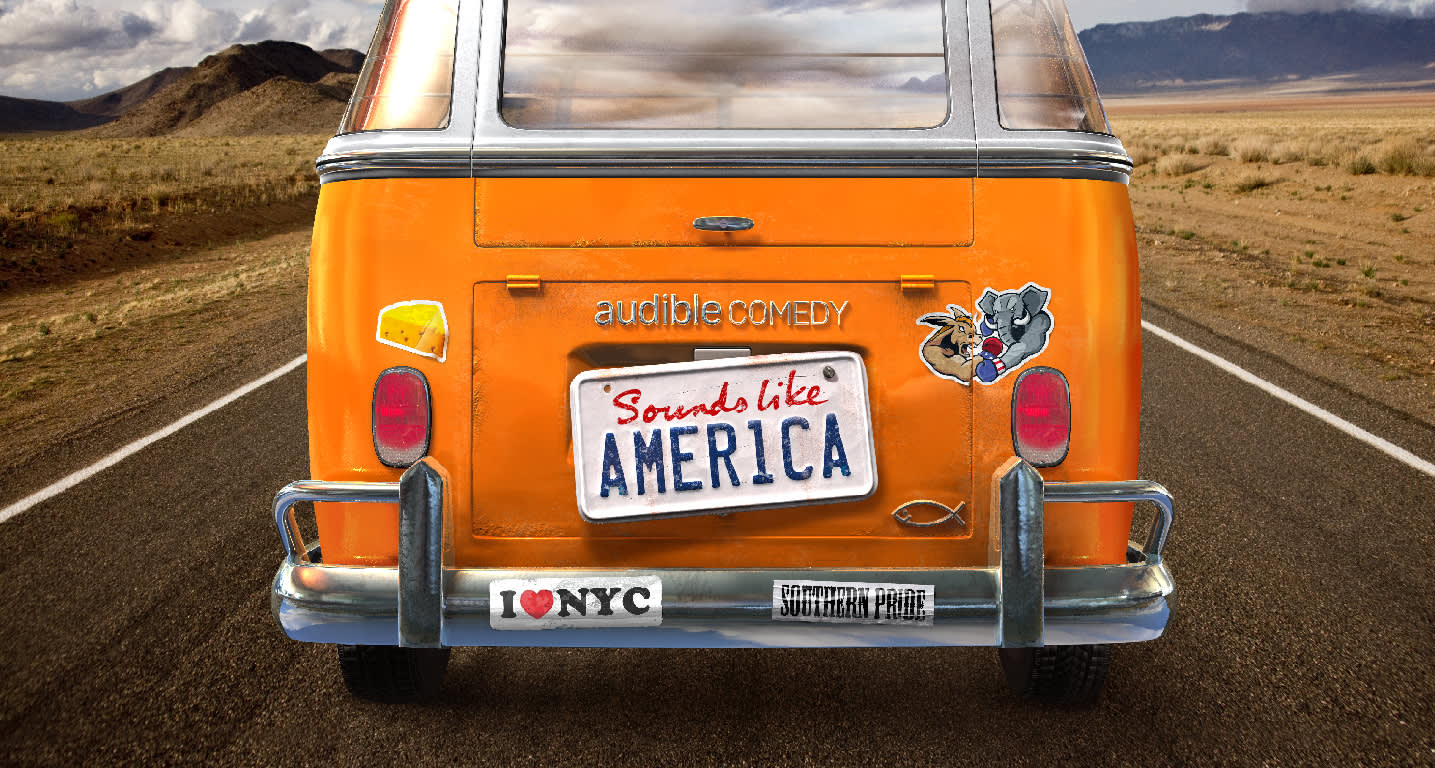“The United States of America was founded on the idea of religious freedom,” says Roy Wood, Jr. “Thomas Jefferson, James Madison, and Lin-Manuel Miranda believed that whatever religion you are — be it Catholic, Methodist, Deist, or even Lutheran — America would be a place where every citizen would have the freedom to believe in whatever they want. Just so long as it’s Jesus.”
Of course, Wood is joking. A stand-up comic and a correspondent for The Daily Show, Wood is one of the hosts of the new Audible comedy show Sounds Like America, which sounds like, well, nothing else.
A sound collage that plumbs the similarities and differences of the American experience from all corners of the country, Sounds Like America is something of a panacea in a fractured and bilious post-election climate. Each episode comes with a theme — such as the South or Midwest, religion, immigration — and switches between pre-recorded stand-up comedy clips on the topic, and interviews with comics and people on the street.
“This is very different from a show about America you might hear on public radio,” says Leah Rose, a co-producer on the show. “There’s no obvious hand-holding. It lets the listener sit back, and the collage washes over them.” As it washes over, the listener gets multiple perspectives on one topic. “These are the things getting missed in the media because the conversation right now is about the things that divide us,” she says.
In the episode on the South, comedians and street interviews reflect on different experiences with race and racism: “If you’re not an African-American, you’re an outsider,” says one man, interviewed about his town. Cut to comedian Mark Normand asking, “You ever go to a town so small they’re still racist toward certain white people? They’re like, ‘Hey watch out over there, that’s where the Dirty Irish live!’”
“What I have really enjoyed most about the show is the idea that there are many Americas.”
That episode is hosted by Wood, because that’s where he’s from. (“Whatever you think of me or like about me, to pay me a compliment is to pay a compliment to the South,” says Wood. “I don’t want that ever to be confused.”) Wood also hosts the episode on religion. Jackie Kashian takes on the comedic expanse that is the Great Northwest, while Aisha Tyler and Andy Richter headline future episodes about The Bay Area and Chicago, respectively. Another, titled “The Melting Pot,” will be helmed by comic and writer Michelle Buteau.
Each episode works hard to address stereotypes and offer counterpoints — while sometimes acknowledging that stereotypes become stereotypes for a reason. (Many Chicagoans are Bears-obsessed sausage eaters who drink a lot, who are nice but sometimes racist and don’t have patience for your bullshit.) It addresses topics that are often politically fraught and socially charged with a directness that few people outside of comedians can get away with. The interviews, which range from light to serious and feature a range of comics and people on the street, give the show its humanity.
“The show is an excellent tool that uses humor to illuminate different prisms of a subject you would not have considered if not for the comedian,” says Wood. “Comedians, to a large degree, are some of the last real reporters left in this world.”
The first comedian Wood credits with challenging his own his thinking was George Carlin. “He would take whatever you believed, and whatever reasons you think you should believe, and set [it] on a table and grab a hammer and go to work on it,” he says. “By the end of his comedy set, he would have reassembled it.” From Carlin, Wood progressed through Paul Mooney and Doug Stanhope, both comedians’ comedians. Wood’s first one-hour Comedy Central special, Father Figure, aired last month.
“He’s brilliant, and his thing is being a normal guy,” says Rachel Hamburg, a Sounds Like America co-producer. “He’s this extremely relatable frustrated man being presented with the issues of being a black man in America — but also fast-food restaurants and the frustrations of people talking to him in grocery lines.”
Wood does often act and sound like an Everyman, but that’s just where his comedy starts, not where it ends. “Relatability is cool, but it’s not paramount,” he says. “If you’re always being relatable, are you pushing people out of their comfort zone, challenging the status quo?”
But the show manages to walk the line here. In the 12 episodes produced so far (only seven have been released to date), more than 250 different voices are featured. The producers drew from an Audible stand-up comedy archive that holds thousands of hours of material dating back to 2009.
“What I have really enjoyed most about the show is the idea that there are many Americas,” says Hamburg. “By putting them together in a package that’s funny and loving toward this country and unafraid to pull punches, we can take a look at America in a way that doesn’t try to make it seem coherent. There are many things to love about growing up in America. It is also a country that fails a lot of us. It would be troubling to me if we just reinforced one vision of America without exploring the rest of it.”
Sounds Like America is now available on Channels in the Audible app. Season 2 runs 03/09 - 4/13, with new episodes on Thursdays. Listen to a preview:

Sounds Like America S2 Excerpt
Audible presents Sounds Like America
Audible Channels is available free as part of your Prime membership. Learn More.




